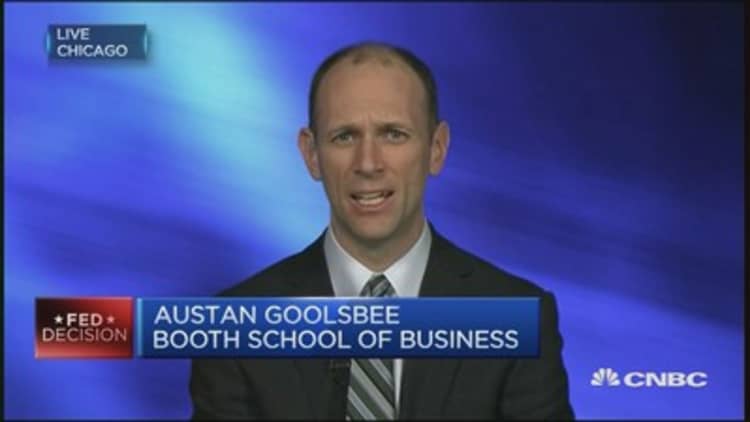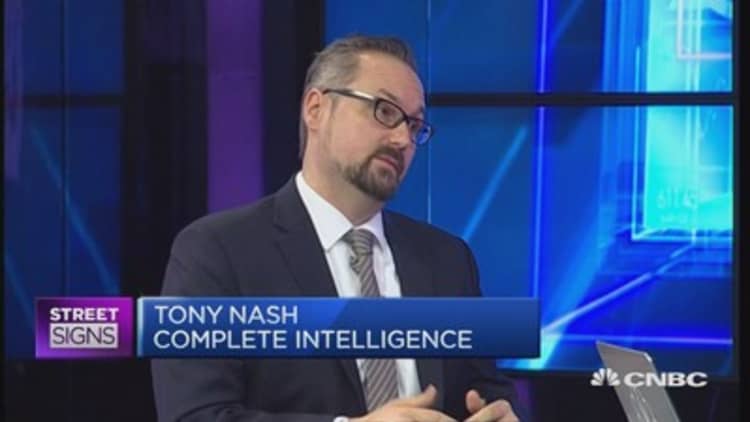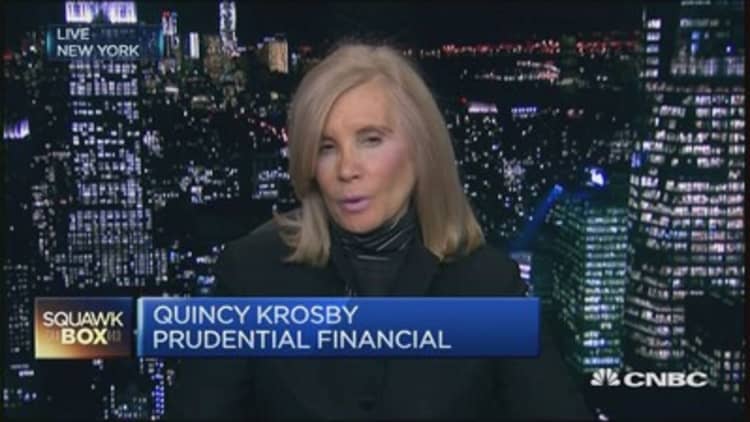
Markets in Asia trimmed early losses to trade mixed Thursday, despite a lower finish on Wall Street after the Federal Reserve appeared to temper its expectations for U.S. economic growth.
Mainland Chinese markets extended their long rout. The main shed 78.07 points, or 2.9 percent, to close at 2,657.48; the index is down 24.9 percent since the start of 2016. The Shenzhen composite finished 71.08 points, or 4.2 percent, lower at 1,629.06.
Hong Kong's closed 0.75 percent higher.
Japan's retraced some losses to close down 122.47 points, or 0.7 percent, at 17,041.45; earlier the index fell as much as 1.0 percent. Across the Korean Strait, the Kospi eked out gains to close up 9.07 points, or 0.5 percent, at 1,906.94.
Down Under, the ASX 200 erased losses to close up 29.75 points, or 0.6 percent, at 4,976.20, with the financials sector gaining 0.5 percent and materials gaining 0.8 percent.
"While Asian markets got off to a poor start in the wake of the Fed decision, (they) seemed to have turned round and continued to push into positive territory soon after U.S. futures markets reopened," Angus Nicholson, a market analyst at spreadbetter IG, said in a note Thursday.
U.S. futures for the Dow Jones industrial average, the Nasdaq and the S&P 500 traded up between 0.3 and 0.8 percent.
Fed leaves rates unchanged



Overnight, the Fed opted not to raise interest rates at its January meeting and gave no indication that it was changing course on its rate-hiking path ahead.
But in its post-meeting statement, the Fed tweaked its view of the U.S. economy, noting that growth had slowed, business investment had moderated and inventory investment had decelerated. The central bank said it was "closely monitoring global economic and financial developments and is assessing their implications for the labor market and inflation, and for the balance of risks to the outlook."
The central bank also said inflation was expected to remain low in the near term due in part to further declines in energy prices. But it sees the effects as transitory.
Austan Goolsbee, an economics professor at the Chicago Booth School of Business told CNBC's "Squawk Box" the Fed's forecast model was off.
"The model keeps saying we're about to take off, we're about to have inflation. Look, unemployment is down, we're about to take off, we're about to have inflation. And it never happens."
He added that the Fed "did not give enough weight to looking around and seeing the real problems that exist in the rest of the world and I think it's going to come back to bite them."
But others still expect the Fed to remain on a hiking path.
Barclays said in a note that by keeping rates unchanged in January, the Fed left its options open for March, depending on how key economic indicators performed. "The main surprise here was that the statement leads with strong labor market momentum before characterizing growth as having slowed," Barclays said.
That could mean the committee believes the signal from labor markets more than activity data, Barclays said, adding "particularly if that slowing was driven by transitory factors as we expect. This would be consistent with our view that there is excessive pessimism about the risk of recession in light of accelerating payroll growth in the fourth quarter."
Oil dips again in Asian trade
Oil prices were down in Asian trading hours after ticking up overnight on the back of news that non-OPEC oil producer Russia was discussing the possibility of cooperation with OPEC. The reports fanned hopes that a deal was in the works to reduce oversupply that has sent prices to 12-year lows. That uptick overnight came despite data showing rising inventories.
U.S. crude futures were down 1.5 percent at $31.83 after closing up 2.7 percent during U.S. trading hours. Global benchmark Brent was down 1.4 percent at $32.65 a barrel after tacking on 4.1 percent in U.S. trade.
Daniel Ang, investment analyst at Phillip Futures, said in a note that the gains in oil prices during U.S. trading hours could be due to the "market trying to find [any] reasons to buy crude oil." He added that given the current weak fundamentals, gains in WTI and Brent would not last long.
Energy plays around the region were mixed, with Australia's Santos and Woodside closing up 2.1 and 1.5 percent respectively. But Japan's Inpex was down 2.7 percent, Japan Petroleum was lower by 2.4 percent and South Korea's S-Oil slipped 1.7 percent.
Hong Kong-listed shares of CNOOC closed up 2.57 percent, while mainland-listed shares of China Petroleum erased gains to close down 0.5 percent; in late-afternoon trade, shares were up as much as 2.5 percent.
Samsung down 2.55% after Q4 results
In Seoul, shares of tech giant Samsung Electronics closed down 2.6 percent. Before market open, the company reported its October-December operating profit rose 16.2 percent on-year, in line with its earlier guidance. While the company issued a tepid outlook due to expectations of challenging smartphone sales, it also announced plans for a share buyback.
Elsewhere, shares of Sharp gained 3.8 percent after Taiwanese manufacturer Foxconn provided further details of their takeover bid to the electronics maker and its lenders. Reuters reported that part of its 600 billion-plus yen takeover bid included a promise to not cut jobs, citing a source familiar with the matter. Foxconn founder and chairman Terry Gou has also reportedly met government officials to discuss the offer, the report said.
Shares of Hon Hai Precision Industry, Foxconn's trading name, were down 0.3 percent.
Japan announced retail sales for December, which fell 1.1 percent on-year, according to government data, showing some weakness in household demand.
Retail stocks were mixed, with Fast Retailing falling as much as 1.7 percent before paring some losses to close 1.3 percent lower. Seven & I was down 0.2 percent, Takashimaya up 0.4 percent and Aeon gaining 0.1 percent.
Major Japanese exporters Toyota, Honda and Sony closed mostly lower, between down 5.3 and flat. The dollar-yen pair was flat at 118.69 after falling as much as 118.39 earlier in the session. A stronger yen is a negative factor for exporters as it diminishes their overseas profits when converted back into local currency.
The Bank of Japan started its two-day policy meeting on Thursday.
Shares of South Korea-based internet company Naver lost 6.4 percent as the company reported a 5 percent jump in on-year profit for the October-December quarter, which fell short of expectations.
Asciano shares gain 4%
On the upside, shares of Australian ports and rail giant Asciano gained 4 percent on the back of a fresh takeover bid.
Australian port operator Qube Holdings announced that state-owned China Investment Corp. had joined a consortium to make another takeover offer for Asciano.
The consortium, which comprises Qube, Global Infrastructure Management, the Canada Pension Plan Investment Board, and now China Investment, made a new A$8.9 billion ($6.25 billion) cash and shares offer for Asciano, which already has an existing offer from Canada's Brookfield Asset Management.
Asciano, which supports the Brookfield offer, said in a statement that its board was also considering the Qube bid. Qube retraced earlier losses to close up 3.81 percent.
Australian resources stocks were mostly in positive territory, with shares of Rio Tinto and BHP Billiton, two of Australia's largest miners, gaining 2.15 and 0.60 percent respectively. Oz Minerals was down 2.58 percent.
Shares of Fortescue closed up 4.11 percent. The company said iron ore shipments for the previous quarter were roughly flat, but that it reduced net debt further as it drove down production costs. Iron ore shipments for the three months through December were at 42.1 million metric tons, compared with 41.9 million tons in the previous three months.
Overnight on Wall Street
Overnight, U.S. stocks sold off on concerns that the Fed could now be signaling weaker growth with its comments, but did not offer fresh guidance on rate hikes.
The was down 222.77 points, or 1.38 percent, at 15,944.46, while the S&P 500 fell 20.68 points, or 1.09 percent, to 1,882.95. The finished lower by 99.51 points, or 2.18 percent, at 4,468.17.
— Patti Domm contributed to this report.



